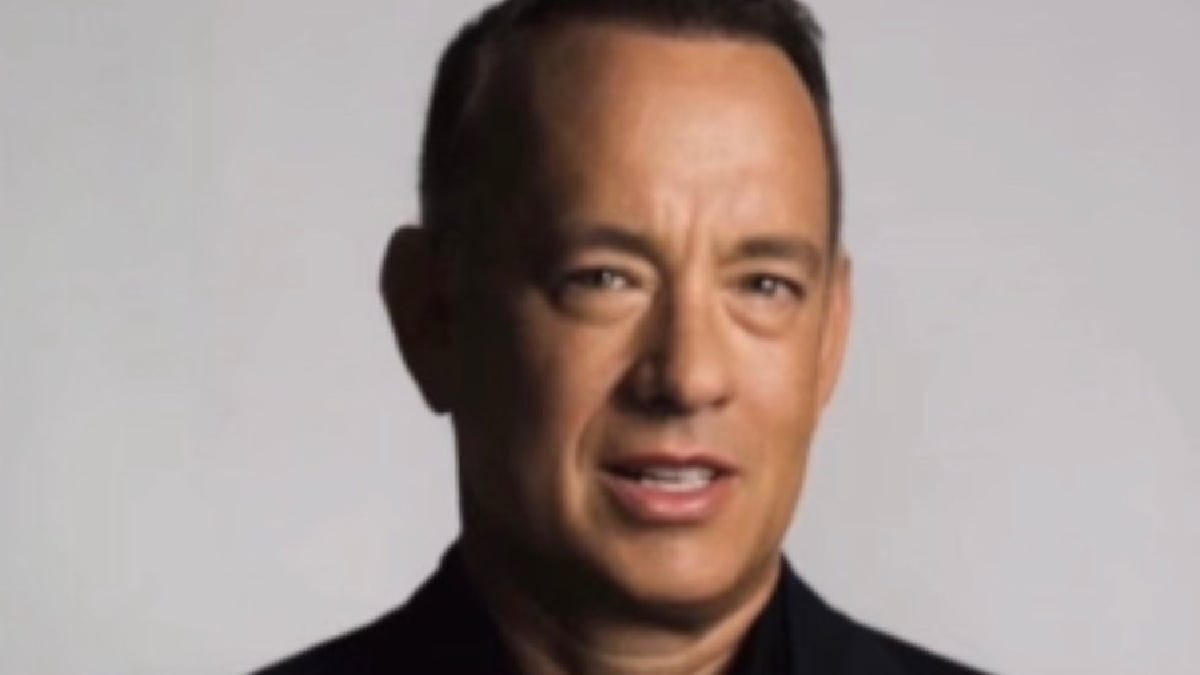AI Deepfake Ads: Tom Hanks, Gayle King Sound Warning
Don't be fooled -- that's not really the Forrest Gump star in a dental video or the TV host in a weight-loss ad.

Tom Hanks used this image to warn people away from an ad that uses an AI-generated version of him.
Tom Hanks is pretty recognizable, whether he's holding a box of chocolates in Forrest Gump or wearing a space suit in Apollo 13. But should you see a dental insurance ad with his picture, look twice. It's not really the Oscar-winning actor.
"Beware!" Hanks wrote on Instagram this weekend. "There's a video out there promoting some dental plan with an AI version of me. I have nothing to do with it."
Hanks shared an image, which The New York Times reports to be an apparent screenshot from the ad, though he declined to answer the newspaper's questions about what company ran the ad or whether he is planning legal action. The Times reported being unable to find the ad online.
Hanks isn't the only celebrity complaining about doctored footage of themselves being used in ads. CBS Mornings host Gayle King made a similar post on Instagram on Monday.
"People keep sending me this video and asking about this product and I have NOTHING to do with this company," King wrote. "I posted this video promoting my radio show on August 31 (swipe to see the original), and they've manipulated my voice and video to make it seem like I'm promoting it ... I've never heard of this product or used it! Please don't be fooled by these AI videos."
The stars' faked images don't seem to be helping make unknown brands famous, however. The King video is paired with an apparent company name, Artipet. But the Times reports that, as with the Hanks video, reporters couldn't figure out what product was being promoted or what company was involved.
King's fans seemed thankful that the host pointed out the footage.
"I knew it was fake the second I saw it yesterday," one Instagram commenter wrote. "So frustrating! People fall for these scams all the time. Ugh! Thanks for pointing it out to everyone!"
How to protect yourself from celebrity deepfakes
Both the Hanks and King posts appear to reference "deepfakes," images or videos that use artificial intelligence to make it look as if a person is doing or saying things he or she actually isn't. As CNET noted in this article, the technology entered the mainstream in 2019 and since has evolved and improved.
The European Union has strengthened its rules around how tech companies must deal with deepfakes with a revised Code of Practice on Disinformation, and in March, video-sharing app TikTok required that synthetic or manipulated media depicting realistic scenes must be clearly labeled as fake. TikTok's changes continue to allow synthetic media featuring public figures under some circumstances, though abuse, political misinformation and commercial endorsements are now prohibited there.
To avoid being fooled, there are practical things you can do when trying to determine whether something is generated by AI. Look for odd phrasing and facial movements, research if the source is reputable and Google the content to see if others are questioning its validity.
Editors' note: CNET is using an AI engine to help create some stories. For more, see this post.

